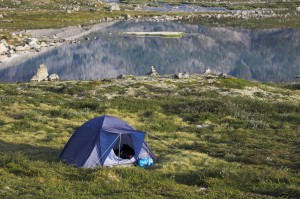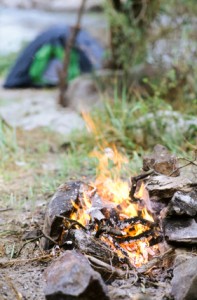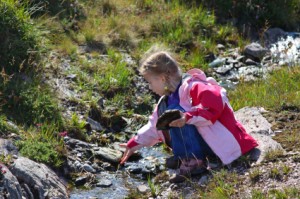How to Patch a Hole in Your Tent
One of the worst things an outdoor enthusiast can find when setting up the tent for the first time of the season, is a tear or hole. The only thing less desirable is to discover the hole after a long, cold, rainy night spent tossing and  turning in the woods. Wet bedding and clothing can make for a miserable camping experience, so campers should be prepared when setting out for a weekend submersed in the elements.
turning in the woods. Wet bedding and clothing can make for a miserable camping experience, so campers should be prepared when setting out for a weekend submersed in the elements.
The truth of the matter, is that it happens to even the most experienced outdoorsmen (and women). The difference between the experienced and the unexperienced, is who comes prepared. The best way to be prepared is by creating a repair kit to store with the camping gear, keeping it stocked at all times. While it may take a little bit of preparation and shopping, it will pay off in the event of an unforseen rip in the side of a tent.
Camping In The Wind
An imaginative individual could think of a million things that could go wrong on a camping trip, while most of us think of just a few minor annoyances common to the outdoor experience. While an injury is always the worst, bad  weather can also put a damper on your camping spirit. Aside from torrential rains, wind can definitely ruin a camping trip, especially when it never stops blowing. There is nothing more annoying than having to get out of your tent every thirty minutes to make sure the stakes haven’t come up out of the ground and that you are not going to blow away in the middle of the night. Starting a fire is almost impossible, and you can hardly hear the people around you when the wind really picks up. Luckily there are a few tips and tricks for you to keep in mind in case your next camping trip is sabotaged by the wind.
weather can also put a damper on your camping spirit. Aside from torrential rains, wind can definitely ruin a camping trip, especially when it never stops blowing. There is nothing more annoying than having to get out of your tent every thirty minutes to make sure the stakes haven’t come up out of the ground and that you are not going to blow away in the middle of the night. Starting a fire is almost impossible, and you can hardly hear the people around you when the wind really picks up. Luckily there are a few tips and tricks for you to keep in mind in case your next camping trip is sabotaged by the wind.
The first thing you should do when you arrive at your camping location is to find an area surrounded by trees or bushes. Try to find a set of bushes or trees that form a sort of wall that will serve as a wind barrier. Make sure that the tree you are under does not have any branches that look to be weak, as they will probably fall in high winds. Be sure to check the area for any animals or objects that could pose a threat, and sweep the area of all debris. Not only will this remove the bugs hiding under leaves, but it will keep debris from flying into your eyes in the wind. Once your spot is cleared, and you are comfortable with the location, its time to set up your tent.
How to find suitable water while camping
Practicing Campfire Safety
Campfires are a staple of outdoor activities, as they act a great equalizer for any lover of nature. They offer up tasty treats such as hot dogs and s’mores, they provide warmth on chilly nights, and they set the perfect scene for a  good old fashioned ghost story. However, campfires have earned themselves quite a dangerous reputation over time, as they have been the cause of many a destructive forest fire. Fire garners a healthy respect in our homes. We check and double check to make sure our gas burners are off, wouldn’t even dream of leaving a candle burning unattended… so why should the rules be any different when we are in the great outdoors? Nature is home to plenty, so campfire safety should be of primary importance for any lover of the outdoors.
good old fashioned ghost story. However, campfires have earned themselves quite a dangerous reputation over time, as they have been the cause of many a destructive forest fire. Fire garners a healthy respect in our homes. We check and double check to make sure our gas burners are off, wouldn’t even dream of leaving a candle burning unattended… so why should the rules be any different when we are in the great outdoors? Nature is home to plenty, so campfire safety should be of primary importance for any lover of the outdoors.
When choosing a spot to build your campfire, it is important to scope out your surroundings for the safest location. An ideal safe location would be far away from leaves, logs, dry grass, steep slopes, or overhanging branches, all of which could catch fire and lead to an out of control burn. Any extra wood you have collected to keep your campfire going should be stored a considerable distance away as well.
Storing Your Camping Gear At Home
Going camping lets you live the simple life for a while, but when you get all your gear back home it can make your daily life more cramped and crowded. Even experienced backpackers, campers, and hikers have difficulty finding a good way to store their camping equipment. You need to find a space that is accessible so that you can grab your gear and go, but that is out of the way enough that your gear will not be constantly under your foot and in your way. Here are a few ideas for storing your camping equipment that will help you find the best solution.
Use An Off-Site Location To Store Your Gear

